In the days when the Tuatha Dé Danann ruled the land, the world was a place of wonder. Ireland, a jewel of green hills and mirrored lakes, was alive with the magic of its ancient inhabitants. Among the greatest of these mystical beings was Lir, a noble chieftain whose wisdom and bravery earned him high esteem. Yet, for all his might, Lir’s life was not without strife. Lir lived in a grand castle, its walls adorned with carvings that told the history of the Tuatha Dé Danann. His lands stretched far and wide, encompassing hills that rolled like the waves of the sea and lakes as still and reflective as glass. At the heart of his joy was his family—his beloved wife, Aoibh, and their four children. Fionnuala, the eldest, was as beautiful and sharp as a beam of sunlight through mist. She had her mother’s grace and her father’s strength. Aodh, the eldest son, was spirited and brave, while the twins, Fiachra and Conn, shared an unbreakable bond, their laughter always in harmony. Lir adored his wife and children. Their home was filled with the sound of music, stories, and laughter. Visitors often spoke of the warmth of Lir’s household, a warmth that made even the coldest night feel like spring. But life is as unpredictable as the Irish weather. One fateful winter, Aoibh fell ill. Despite Lir’s prayers and the efforts of the Tuatha Dé Danann’s finest healers, Aoibh passed away, leaving a void in Lir’s heart and a shadow over his once-bright home. Stricken with grief, Lir turned his attention to his children, determined to shield them from pain. Yet, he knew they needed a mother’s love. At the urging of his allies, he agreed to marry Aoife, Aoibh’s younger sister, who had always been fond of the children. Aoife promised to care for them as if they were her own. At first, the arrangement seemed to work. Aoife brought an air of calm to the castle, and the children, though still mourning their mother, began to smile again. But Aoife soon grew envious of the love Lir lavished on his children. Every embrace, every word of affection stoked the fire of jealousy in her heart. She wanted Lir’s love for herself and resented the bond he shared with Fionnuala, Aodh, Fiachra, and Conn. One morning, Aoife made a decision that would change the course of history. She approached Lir with a suggestion: the children should visit their grandfather, Bodb Derg, the High King of the Tuatha Dé Danann. Lir agreed, seeing no reason to distrust his wife. The children, excited at the prospect of an adventure, eagerly prepared for the journey. They rode with Aoife through verdant forests and over rolling hills, their laughter ringing through the air. But as they neared Lough Derravaragh, a still and mysterious lake, Aoife’s demeanor changed. She led the children to the shore, her eyes dark with intent. Summoning ancient and malevolent magic, Aoife raised her arms and spoke a curse. A gust of wind howled, and the children’s bodies shimmered. Fionnuala cried out in fear as her arms turned into wings of white, and one by one, her brothers transformed as well. In mere moments, the four radiant children were no longer human but swans, their feathers as pale as the moonlight on water. The children, though trapped in their new forms, retained their minds and voices. They pleaded with Aoife to release them, but she coldly decreed their fate. They would remain as swans for 900 years: 300 years on Lough Derravaragh, 300 years on the tempestuous Straits of Moyle, and 300 years on the remote waters of Inis Glora. Only the toll of a bell and the coming of Christianity would break the spell. Satisfied with her cruelty, Aoife departed, leaving the children behind. Yet guilt began to gnaw at her. Upon returning to Lir, she claimed that an accident had befallen the children. But her lies unraveled, and Lir, distraught, discovered the truth. He banished Aoife, cursing her to wander the earth in the form of a demon. The children’s first years as swans were a strange mix of sorrow and solace. They remained together, their bond unbroken by their transformation. Fionnuala, the eldest, took on the role of protector, her voice a steady anchor for her younger brothers. The four swans swam across the calm waters of Lough Derravaragh, their songs filling the air with a haunting beauty. Visitors to the lake were captivated by the swans’ melodies. Word of their plight spread far and wide, and though many came to witness their beauty, none could undo the curse. Lir often visited the lake, speaking to his children and mourning their fate. His presence was a comfort, a reminder that they were not forgotten. As the years passed, the children grew accustomed to their swan forms. They learned to navigate the waters, to sing not just of sorrow but of hope. Yet the day came when they had to leave Lough Derravaragh, the first chapter of their exile complete. The journey to the Straits of Moyle was arduous. The winds whipped around the swans, and the waves rose like mountains. The straits were a place of great peril, where the sea seemed determined to claim them. The winters were bitterly cold, the summers short and harsh. Through it all, the swans remained together. Fionnuala shielded her brothers from the worst of the storms, her wings a canopy against the freezing rain. Aodh, Fiachra, and Conn leaned on one another for strength, their songs now tinged with the raw power of the sea. It was during this time that the swans faced their greatest challenges. Fionnuala often worried for her younger brothers, especially during the long winters when food was scarce. Yet their love for one another sustained them, a light in the darkness of their exile. The years dragged on, each day blending into the next. But the swans endured, their spirits unyielding. When the time came to leave the straits, they did so with a mixture of relief and trepidation. Ahead lay Inis Glora, the final chapter of their exile. Inis Glora, a remote island in the western seas, was a place of eerie beauty. The waters around it were calm, but the island itself was desolate. The swans, now weary from centuries of suffering, settled into a quiet existence. Their songs grew softer, their voices carrying the weight of their long ordeal. Centuries passed, and the world around them changed. The Tuatha Dé Danann faded into legend, their magic giving way to a new faith. One day, a distant sound reached the swans’ ears: the tolling of a bell. It was a sound they had never heard before, yet it stirred something deep within them. A monk named Mochaomhóg, guided by divine inspiration, found the swans on Inis Glora. He was moved by their plight and offered them sanctuary. Each day, he rang his bell and shared the teachings of Christianity. For the first time in centuries, the swans felt hope. One morning, as Mochaomhóg recited his prayers, the swans felt a change. Their feathers began to shimmer and dissolve, revealing their human forms. Yet the years had taken their toll, and their bodies were frail and aged. The children of Lir embraced the monk, their voices filled with gratitude. They entrusted him with their story, ensuring it would be remembered for generations. Soon after, they passed away, their spirits ascending to a place of eternal peace. The tale of the children of Lir is one of endurance and love, a reminder of the bonds that sustain us through life’s darkest trials. Their story lives on in the lakes and shores of Ireland, where the whispers of swans can still be heard, echoing the timeless melody of their immortal song.The Joyful Years of Lir
The Arrival of Aoife
The Journey to Lough Derravaragh
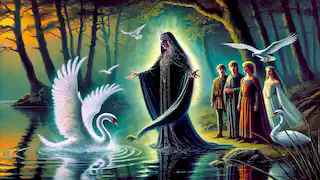
The First Exile: Lough Derravaragh
The Second Exile: The Straits of Moyle
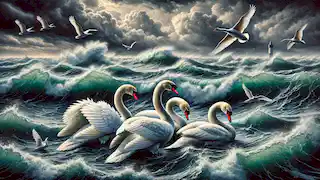
The Third Exile: Inis Glora
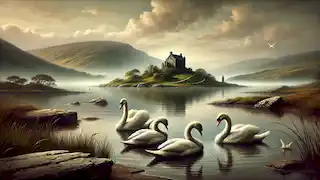
The End of the Curse
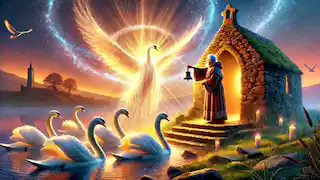
Legacy of the Children of Lir
The Children of Lir: A Tale of Love, Loss, and Endurance
Reading Time: 7 min
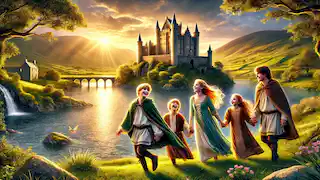
About Story: The Children of Lir: A Tale of Love, Loss, and Endurance is a Myth Stories from ireland set in the Ancient Stories. This Dramatic Stories tale explores themes of Perseverance Stories and is suitable for All Ages Stories. It offers Cultural Stories insights. A timeless Irish legend of love, loss, and resilience.
















